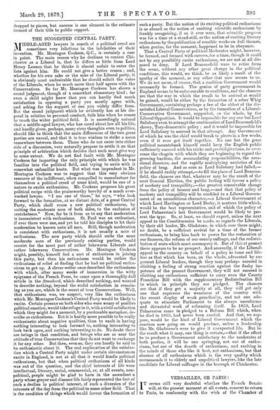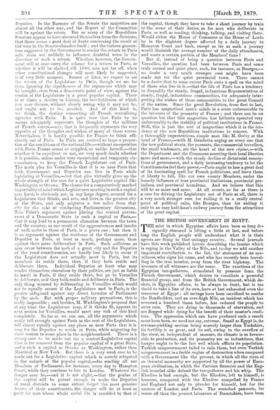VERSAILLES, OR PARIS?
I T seems still very doubtful whether the French Senate will, at the present moment at all events, consent to return to Paris, in conformity with the wish of the Chamber of Deputies. In the Bureaux of the Senate the majorities are almost all the other way, and the Report of the Committee will be against the return. But so many of the Republican Senators appear to have absented themselves from the divisions, that there seems a good deal of doubt concerning the result of the vote in the Senate-chamber itself ; and the various guaran- tees suggested by the Government to render the return to Paris safe, seem not unlikely to influence doubtful votes in the direction of such a return. Whether, however, the Govern- ment will at once carry the scheme for a return to Paris, or whether it will be shelved till 1880, now not far off, when other constitutional changes will most likely be suggested, is of very little moment. Sooner or later, we expect to see the return of the Legislature to Paris, though- we are far from ignoring the significance of the arguments which may be brought, even from a democratic point of view, against the session of the Legislature in a great popular capital. There is at times a destiny in history, the inevitableness of which you may discern, without clearly seeing why it may not be, and ought not to be, avoided. And of this kind is, we think, the destiny connecting all French centralising agencies with Paris. It is quite true that Paris by no means adequately represents the thoughts of the millions of French voters,—nay, that it frequently represents the very opposite of the thoughts and wishes of many of those voters. Nevertheless, it is hardly possible for France to think effi- ciently out of Paris. In Paris are centred so large a propor- tion of the conditions of the national life,—without co-operation with Paris, France seems so crippled, so unlike herself,—that whether it be expedient or not, we very much doubt whether it is possible, unless under very exceptional and temporary cir- cumstances, to keep the French Legislature out of Paris. The main plea for Versailles is that it is so near Paris that both Government and Deputies can live in Paris while legislating at Versailles,—but that plea virtually gives up the whole strength of the case for a quiet Legislative capital like Washington or Ottawa. The chance for a comparatively marked impartiality of mind which Legislatures meeting in such a capital may have, is obviously not, in any large degree, secured for a Legislature that thinks, and acts, and lives in the greatest city of the State, and only migrates a few miles from that city for the sake of conducting Parliamentary discussions. Tom Paine's argument against placing the central govern- ment of a Democratic State in such a capital as Paris,— that it may lead to a permanent alienation between the town and the country, as one result of the aggressiveness and insults of such mobs as those of Paris, is a grave one ; but then it is an argument against the residence of the Government and Deputies in Paris, at least as much, perhaps more, than against their mere deliberation in Paris. Such collisions as may occur between the mob of a great city and the Deputies of the rural constituencies, are hardly less likely to occur if the Legislature does not actually meet in Paris, but its members do reside there, than if they both reside and deliberate there. Individual Deputies at least who may render themselves obnoxious by their politics, are just as liable to insult in Paris, if they reside there, but go to Versailles tc deliberate, as if they both reside and deliberate in Paris. The only thing secured by deliberating in Versailles which would not be equally secure if the Legislature met in Paris, is the greater safeguard against any direct invasion of Parliament by the mob. But with proper military precautions, this is really impossible ; and besides, M. Waddington's proposal that at any time the Legislature may, if it thinks fit, appoint its next session for Versailles, would meet any risk of this kind completely. So far as we can see, all the arguments which really tell strongly against Paris as the seat of the Legislature, tell almost equally against any place so near Paris that it is easy for the Deputies to reside in Paris, while migrating for their session to some place in the neighbourhood. There is a strong case to be made out for a central Legislative capital that is far removed from the popular capital of a great State, —for such a capital as Ottawa or Washington, rather than Montreal or New York. But there is a very weak case to be made out for a Legislative capital which is merely relegated in the suburb of the popular capital,—for sending all our Members of Parliament, for instance, every day to Hampton Court, while they continue to live in London. Whatever the danger may be,—and it is not slight,—that the genius of the capital will be potent enough to make the Deputies of rural districts to some extent forget the most genuine desires of their constituents, the danger will be at least as great for men whose whole social life is moulded by that of the capital, though they have to take a short journey by train to the scene of their duties, as for men who deliberate in Paris, as well as reading, thinking, talking, and visiting there. Would either the House of Oomnions or the House of Lords be in the slightest degree affected by a daily journey to Hampton Court and back, except so far as such a journey would diminish the average number of the daily attendances, and waste a certain portion of the Members' time ?
But if, instead of being a question between Paris and Versailles, the question had been between Paris and some truly central and quiet place, such, for instance, as Bourges,— no doubt a very much stronger case might have been made out for the quiet provincial town. There cannot be a doubt that to some extent Paris casts a spell on the mind of those who live in it —that the life of Paris has a tendency to disqualify the steady, frugal, industrious Representatives of steady, frugal, industrious communities, for adequately inter- preting the wishes of those communities to the great Council of the nation. Since the great Revolution, from first to last, Paris has magnetised men's minds in a sense unfavourable to the interests of the peasantry of France ; and there can be no question but that this magnetism has hitherto operated very unfavourably to the stability of political institutions in France. Still, this is just the sort of magnetism which it is the ten- dency of the new Republican institutions to remove. With a thoroughly unpretentious, simple man like M. Grevy at the head of France,—with M. Gambetta urging on every one that the new political strata, the peasants, the commercial travellers, the small tradesmen, are the heart of the new re'ginae,—with the Department and the Commune asserting their local liberties more and more,—with the steady decline of dictatorial concep- tions of government, and a daily increasing tendency to let the Constituencies feel their power,—Paris ought to lose a great deal of its fascinating spell for French politicians, and leave them at liberty to fall, like our own county Members, under the homely influence of true provincial limitations, provincial pre- judices, and provincial humdrum. And we believe that this will be so more and more. At all events, so far as there is a case for driving the Legislature out of Paris at all, there is a very much stronger case for exiling it to a really central point of political calm, like Bourges, than for exiling it only to an easy half-hour's railway journey from the attractions of the great capital.



































 Previous page
Previous page